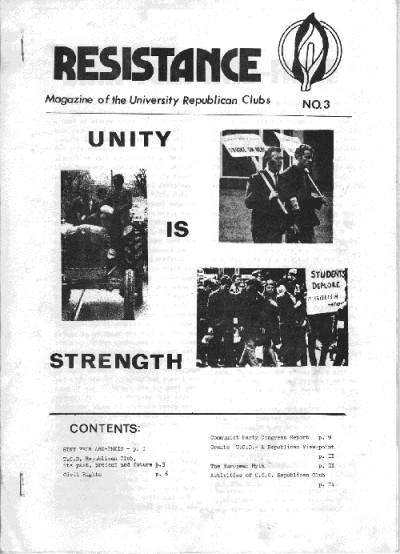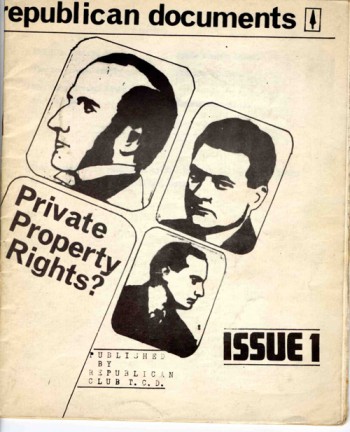Resistance, No. 3

| Date: | 1972 |
|---|---|
| Organisation: | University Republican Clubs |
| Publication: | Resistance [URC] |
| Issue: | Number 3 |
| Type: | Publication Issue |
| View: | View Document |
| Discuss: | Comments on this document |
| Subjects: | European Union (EEC, EC, EU) |
Please note: The Irish Left Archive is provided as a non-commercial historical resource, open to all, and has reproduced this document as an accessible digital reference. Copyright remains with its original authors. If used on other sites, we would appreciate a link back and reference to The Irish Left Archive, in addition to the original creators. For re-publication, commercial, or other uses, please contact the original owners. If documents provided to The Irish Left Archive have been created for or added to other online archives, please inform us so sources can be credited.
Commentary From The Cedar Lounge Revolution
30th June 2008
Resistance was a magazine (originally entitled Republican News) produced by the Republican Clubs in Trinity College Dublin during the early 1970s. The RCs had been founded in the late 1960s but had been ‘defunct for some time due to the imprisonment of Conor Lynch and Pat O’Sullivan’. Revived it immediately ‘voted in favour of affiliation to Sinn Féin Gardiner Place’. The E.E.C. provided a ready made issue to organise around – although the magazine notes that the efforts of the Republican Clubs to assist in the development of a ‘broad based Socialist Alliance of left wing groups such as the Markievich Society, the Labour Party and the Maoists on such common issues as the EEC… petered out…[as] these groups seemed to be more interested in talking for the most part about their own policies and refusing to give any ground on them’.
As ever with such groups the magazine notes the ‘first sale of the United Irishman amounted to 25 dozen copies within the College…’.
The tone is intriguing. For example one reads that the ‘Club will continue its policy of challenging political hacks on open platforms in the University, and will intensify its efforts to show up the bankruptcy of Free State capitalism’. Didn’t hear much of that language in later years.
Note the coverage of both the (Official) Sinn Féin Ard Fhéis and the Communist Party Congress. This period, particularly in the run-up the the EEC vote saw considerable cooperation between OSF, the CPI and the left in the Labour Party through the Liaison of the Left.
The E.E.C. is characterised in an article as an instrument of U.S. policy developed in order to be a ‘defensive ring set up to protect capitalist interests in Western Europe…’ although it acknowledges in passing that ‘though political idealism may have motivated some of the individuals involved, and undoubtedly inspired many of the ordinary people, it is the nature of the underlying forces which determine the nature of the Community’.
Another article of note is the piece penned by a ‘worker’ with the title ‘How could students participate in working class activities’ which probably has even more relevance today than when it was written. Whether the not entirely idyllic relationship the ‘worker’ describes when s/he recalls ‘fraternisation’ between students and workers in the dim and distant past was ever accurate, the article certainly articulates various perceptions.
It also references the Internationalist-Maoist’s in rather uncomplimentary terms… which in fairness to the latter indicates that their reputation succeeded them_ ‘the revolutionary Maoists adopted a ‘bull in a china shop strategy’: superficially it may appear a correct even courageous action on the part of the student-revolutionary who takes up a job in a factory…hoping to raise the political consciousness of the workers…from the worker’s point of view the situation may not be so clear-cut. He knows there is vast unemployment in the country: he will most likely have a relative or friend searching for a job, yet here is a member of the privileged classes denouncing on the one hand the rotteness of the political system we live under and on the other hand helping to exacerbate the problems created by that system by taking up a job he doesn’t need and thus depriving the worker’s relations and friends’._
The old OSF/WP pragmatism (and antagonism) evident there then.
And another trait of that group is the complete absence of any reference to their rivals for the Republican title, for not one direct mention of the Provisionals can be found throughout. Instead in an article on Civil Rights it is noted that:
“Pure” national struggle goes to the other extreme from “pure” social struggle [an interesting reference to preceding thoughts on the Derry Labour Party]. It sees anti-imperialism in oversimplified military terms. The British are to be got out of Ireland by force of arms and whoever assists them must be dealt with as a collaborator. Therefore the Protestant working class is delivered a simple ultimatum rather than opened up through democratic channels for mass agitation to develop its objective interest against imperialism.
And there is also indirectly a reference from the CPI Congress where it is noted that a resolution ‘condemned ‘bling cats of violence by ‘elitist’ anti-Unionist groups [and] pointed out that ‘the state terror inaugurated by the British Army cannot be defeated by such acts of counter violence directed at civilians in their places of work, their centres of social gatherings and other public places. Such acts only help to grieviously divide the working people.’.
For those cynical about political activities rooted in third level institutions the magazine when detailing the history of the Republican Club in TCD notes that ‘[during 1970 and 1971] the people who had started the Club had by now graduated…’
A perennial problem…
More from University Republican Clubs
University Republican Clubs in the archive

Comments
No Comments yet.
Add a Comment
Comments can be formatted in Markdown format . Use the toolbar to apply the correct syntax to your comment. The basic formats are:
**Bold text**
Bold text
_Italic text_
Italic text
[A link](http://www.example.com)
A link
You can join this discussion on The Cedar Lounge Revolution
By: john keane Thu, 16 Jun 2011 18:49:45
A Republican Club was formed in UCD in January 1970 immdiately after the Ard Fheis walk out by the emergent provisionals.
The core group of the UCD club were student activists from Belfast Derry and Newry who had been involved in Nicra and PD but there were members from throughout the 32 counties.
Meetings were held in room in Pearse St provided by TCD Republican Club.
Reply on the CLR
By: scholarships and grants Fri, 02 Sep 2011 00:08:14
Thanks for revealing your ideas. One thing is that college students have a choice between national student loan plus a private student loan where it can be easier to select student loan consolidating debts than through the federal education loan.
One important issue is that when you are searching for a student loan you may find that you will want a cosigner. There are many cases where this is true because you may find that you do not use a past credit score so the financial institution will require that you’ve someone cosign the loan for you. Good post.
Thanks for this article. I would also like to convey that it can often be hard when you find yourself in school and starting out to create a long credit score. There are many individuals who are just trying to survive and have a protracted or good credit history is often a difficult point to have.
I have learned a number of important things via your post. I will also like to say that there may be situation where you will have a loan and never need a cosigner such as a National Student Support Loan. But if you are getting financing through a traditional financial institution then you need to be able to have a cosigner ready to make it easier for you. The lenders can base that decision using a few components but the biggest will be your credit worthiness. There are some lenders that will furthermore look at your job history and come to a decision based on this but in most cases it will be based on on your scores.
One other issue is when you are in a circumstance where you will not have a cosigner then you may really need to try to make use of all of your educational funding options. You can find many grants and other grants that will supply you with money to help you with university expenses. Thank you for the post.
Reply on the CLR
By: NollaigO Fri, 02 Sep 2011 07:29:16
In reply to scholarships and grants.
??
Ar strae?
Reply on the CLR
By: Gabby Fri, 02 Sep 2011 09:18:26
@8 above Nollaig O. Ron Lindsay at Trinity in the late ’60s graduated in law and went off to the far east for a few years before later getting a legal job in East Africa or somewhere. Alan Matthews went out to a similar area in Africa before going to USA for postgrad studies, and later returned to an academic career in ag. economics at Trinity. He was in the Labour Party, then helped set up the SLP with Noel Browne, Matt Merrigan and others. In recent years has criticised the agricultural subsidies dished out by the EU and Irish Govt to Irish farmers. Doesn’t seem to have any current political affiliations.
Interesting to note that in UCD around 1970 Tony Gregory helped set up a Republican Club. He eventually fell out with the Stickies over northern policy, and went into local politics as an independent, getting elected to the corpo. The rest is inner city and national history.
Reply on the CLR
By: john flavin Fri, 03 Feb 2012 20:35:51
i was informed recently that conor lynch passed away in jan 2012 in the athol bookshop in belfast .can anybody confirm this?
Reply on the CLR
By: paralegal program Tue, 25 Sep 2012 01:02:01
I’m truly enjoying the design and layout of your blog. It’s a very easy on
the eyes which makes it much more enjoyable for me to come here and visit
more often. Did you hire out a designer to create your theme?
Excellent work!
Reply on the CLR
By: free marketing tips Wed, 28 Feb 2018 09:14:24
training combines
The Left Archive: Resistance
Reply on the CLR